Developing story
How MSF is responding to the war in Gaza
An unprecedented humanitarian crisis is unfolding in Gaza, with attacks on civilians, attacks on health care, and a brutal siege.
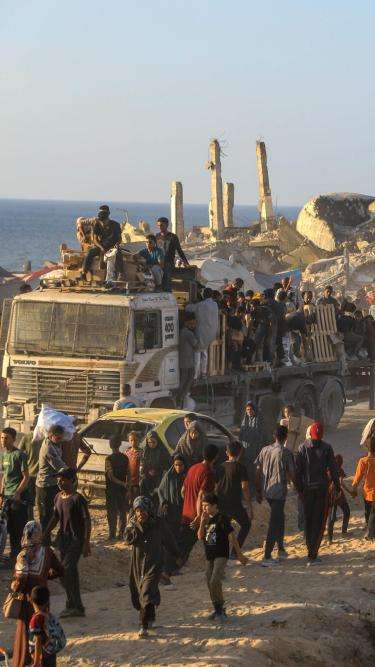
Developing story
An unprecedented humanitarian crisis is unfolding in Gaza, with attacks on civilians, attacks on health care, and a brutal siege.
September 17, 2025 — With the United Nations General Assembly underway, the leaders of more than 20 major aid agencies working in Gaza, including Doctors Without Borders/Médecins Sans Frontières (MSF), are calling on world leaders to urgently intervene after a UN commission concluded that Israel is committing genocide against Palestinians in the Strip.
This determination comes after a nearly two-year investigation by the UN Independent International Commission of Inquiry on the Occupied Palestinian Territory and aligns with what MSF has witnessed on the ground in Gaza: mass killings, the destruction of vital civilian infrastructure, and blockades choking off access to food, water, medicines, and other essential humanitarian supplies.
Doctors Without Borders/Médecins Sans Frontières (MSF) is witnessing a genocide in Gaza.
For nearly two years, Israeli forces have systematically destroyed the conditions necessary for life in the Strip—attacking hospitals, striking tented camps and fragile shelters, destroying vital civilian infrastructure, and choking off access to food, water, medicines, and other basic needs for survival. No one is spared.
Gaza lies in ruins. Since October 2023 more than 60,000 Palestinians have been killed, over 150,000 wounded, and some 44,000 children left orphaned. Those who’ve survived are trapped in an endless cycle of displacement and mental distress under Israeli forces’ evacuation orders, which now cover 85 percent of the Strip. The health and humanitarian workers trying to save lives continue to be killed, including 13 of our own MSF colleagues. Even if Israel’s assault were to end right now, it would take decades to rebuild and recover, and for many Palestinians, the physical and emotional wounds will last a lifetime.
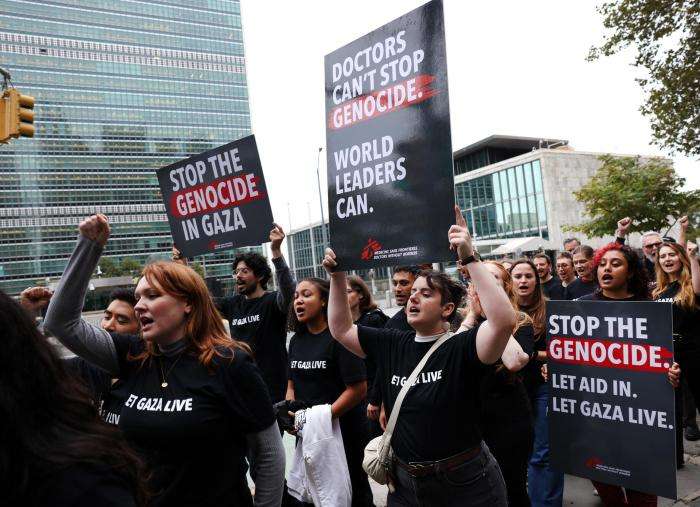
Demand action to surge lifesaving aid to Gaza and suspend arms transfers fueling atrocities.
Add your nameThis genocide must end now. MSF calls on all parties to the conflict for an immediate and sustained ceasefire. Israeli authorities must stop using starvation as a weapon of war and lift the siege. The so-called Gaza Humanitarian Foundation (GHF) scheme backed by the US and Israel—a slaughter masquerading as humanitarian aid—must be dismantled and independent humanitarian aid must be allowed to reach people at scale. And all governments must put a halt to arms transfers that enable the ongoing genocide.
Not a single hospital remains fully functional
A state of famine has been declared in Gaza City
More than 1,580 health workers have been killed
Over 86% of the Strip is under Israeli evacuation orders
d431.png)
Israeli authorities' weaponization of food has caused mass starvation and rising malnutrition cases
1 in 5 children screened at two MSF clinics have moderate or severe acute malnutrition
Childhood malnutrition can cause physical and cognitive damage that no amount of food can undo
Without adequate calorie intake, injuries or burns are not able to heal properly
Malnutrition is not just a food shortage—it’s a life-threatening medical condition. Even if large-scale food supplies reach Gaza in the coming weeks, the crisis will persist. Immediate access to treatment—including therapeutic foods like Plumpy’Nut—will be essential to save lives.
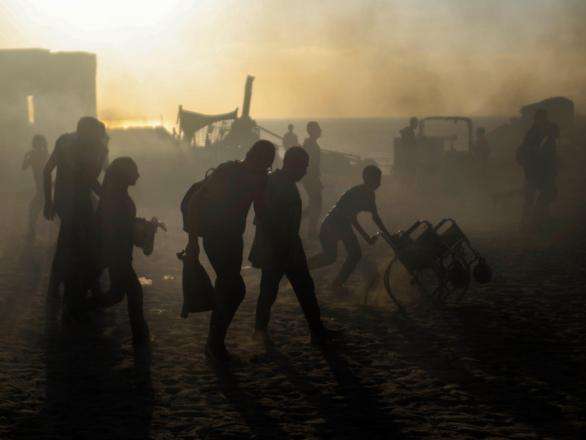
“The GHF [Gaza Humanitarian Foundation] distribution sites masquerading as ‘aid’ have morphed into a laboratory of cruelty—children shot in the chest while reaching for food, people crushed or suffocated in stampedes, and entire crowds gunned down at distribution points. This must stop now.”
— Raquel Ayora, MSF general director
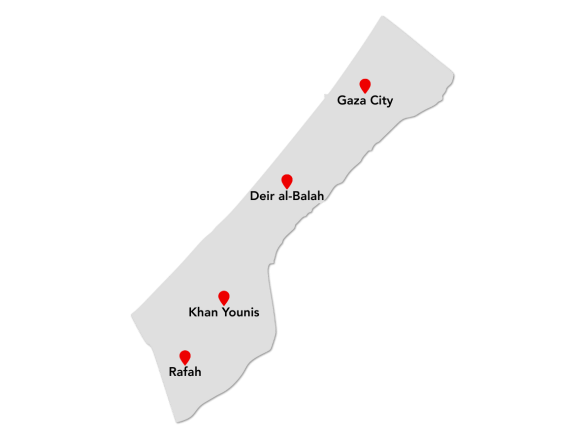
surgical interventions
emergency cases treated
inpatients admitted for care
MSF has over 1,000 staff working in Gaza's hospitals, clinics, and other facilities, including our field hospital in Deir al-Balah and our clinic in Gaza City. Our teams provide surgical care, wound and burn care, malnutrition screening and treatment, maternal and pediatric care, physiotherapy, vaccination, mental health support, water and sanitation support, and care for non-communicable diseases, among other services. We are also providing rehabilitative care for war-wounded children we've managed to evacuate to our reconstructive surgery hospital in Amman, Jordan.
MSF teams have carried out lifesaving work in health facilities across Gaza, including in the Strip's largest hospitals and our own clinics and field hospital. However, due to extremely volatile conditions on the ground—including attacks on health facilities and recurrent evacuation orders—our teams have had to move from facility to facility and continually adapt our activities. Hospitals and clinics we have supported during this war include:
Israeli forces’ have decimated Gaza’s water network. Water treatment plants and other water infrastructure have been attacked, damaged, and destroyed. Gaza has no independent means of producing drinkable water, as groundwater is too salty or contaminated by sewage and agricultural chemicals to be fit for human consumption. As part of the siege, Israeli authorities’ have cut off or restricted the flow of fuel and electricity, which the remaining water plants need in order to function.
Israeli authorities have also blocked the entry of key water production supplies. For example, since June 2024, only 11 percent of MSF’s requests to bring in desalination supplies have been approved. Some authorization requests for items like water pumps, spare parts, and water tanks have been pending for months.
Lack of water is life-threatening and can contribute to health issues like diarrhea, jaundice, and scabies—all of which are on the rise in Gaza. Dehydration can be lethal and also makes it harder to recover from other diseases. As such, water and sanitation is a significant part of MSF’s response in Gaza. We carry out water trucking activities, establish distribution points, and provide technical support to desalination plants. Despite the challenges, the desalination plants we support produced more than 9.5 million gallons per week in the first half of August. However, the needs far exceed our capacity to respond at scale.
Our teams also work in partnership with PARC (the Agriculture Development Association) to provide sanitation support to a camp hosting 400 people with disabilities and camp shelters in Deir al-Balah and Khan Younis.
Israel’s systematic deprivation of aid—including food, water, electricity, and medical supplies—has led to preventable deaths, malnutrition, and profound trauma; and has manufactured a situation of famine in Gaza. At the same time, it has prevented humanitarian organizations from responding to the needs at scale, severely inhibiting the flow of supplies needed to operate.
Prior to the total siege launched on March 2, MSF provided over 636 tons of logistic and medical equipment from our international supply centers—as much as 30 planes or 130 trucks full. However, some supplies that are critical to our operations and the security of our staff have been difficult to transport into Gaza. These include generators, desalination stations and motor pumps, oxygen concentrators, vehicles, and equipment for communication.
The medical needs in Gaza are immense and urgent, not only for people wounded or burned in strikes but for children with malnutrition, pregnant women who are about to deliver, the elderly, and people with chronic diseases. At the same time, the provision of care has become even more challenging due to the systematic dismantling of Gaza’s health system, with repeated attacks by Israeli forces on health facilities and personnel, as well as shortages of essential supplies including vital medicines and medical equipment. The core medical needs our teams are seeing on the ground include:
With the aid blockade hindering the entry of food, including therapeutic food for malnutrition care, the nutrition situation in Gaza is deteriorating further as the risk of malnutrition increases. On August 22, 2025, the United Nations-coordinated Integrated Food Security Phase Classification (IPC) system officially declared famine in Gaza governorate, in the north of the Gaza Strip. Famine thresholds are expected to be crossed in Deir al-Balah and Khan Younis governorates by the end of September. Many of our staff have reported eating just one meal a day. In our hospitals, we're seeing children with severe burns from bomb blasts and cooking accidents who aren't healing properly because they aren't getting enough calories each day to fuel their recoveries.
As the Israeli offensive intensifies, our teams are again receiving mass casualties following bombings and attacks, with many patients requiring care for war wounds, crush injuries, and burns. MSF teams have seen an increase in the number of patients with burn injuries—most of them children. Many of these children were burned by bomb blasts; others by boiling water or fuel used for cooking or heating in makeshift shelters.
Infections resulting from poorly treated wounds are a growing concern, driven by the difficulty wounded people face accessing care and follow-up, shortages of supplies, and lack of access to hygiene. There is also high risk of infectious diseases including diarrhea, acute respiratory infections, skin infections, and hepatitis due to overcrowding and poor hygienic conditions in camps where displaced people are sheltering, and shortages of medicines and medical supplies.
Even before the current war started, many years of instability had already taken a toll on the physical and mental health of Gaza’s children, leaving many with life-changing injuries, amputated limbs, and the trauma of losing parents and other loved ones along with their homes and schools. Children are also especially vulnerable to various health risks arising from the lack proper access to water, food, and warm shelter. The health needs of children are so high that the pediatric department at Nasser Hospital was operating beyond its bed capacity from July to December 2024. Over a quarter of patients were admitted for respiratory distress syndrome, a condition that can present in premature infants and makes them even more vulnerable in dire living conditions many face in Gaza.
Pregnant women in Gaza are forced to navigate severe obstacles to reach medical facilities for prenatal care or delivery, including traveling dangerous routes amid fighting and without safe transportation, which can delay access to care and increase the risk of complications. Those able to reach a hospital often find them without capacity, and end up giving birth in deplorable conditions in plastic tents or public spaces; others must return to their makeshift shelters mere hours after undergoing cesarean sections. MSF teams in Gaza have assisted more than 13,000 deliveries to date. By January 2025, MSF teams were carrying out more than 100 cesarean sections per month.
MSF teams are running out of medical supplies such as anesthetics, pediatric antibiotics, and medicines for chronic conditions like epilepsy, hypertension, and diabetes; and it has been impossible to restock items due to the blockade. Teams have been forced to start rationing medications and even turn some patients away because they don’t have the proper tools to treat them.
The situation for Palestinians in the West Bank has worsened significantly with the onset of the war in Gaza. Since October 2023, at least 995 Palestinians have been killed in the territory, including at least 210 children, according to OCHA. Our teams have observed an escalation of extreme violence against Palestinians by Israeli forces and settlers, particularly in Jenin, Tulkarem, and Tubas. This violence, along with home demolitions by Israeli forces, have forcibly displaced tens of thousands of Palestinians, leaving many without proper shelter or access to basic needs such as food, water, electricity, and hygiene products. The situation is harming people's mental and physical well-being.
In addition to the state-backed violence, Palestinians in the West Bank face severe movement restrictions imposed by Israeli forces, including road closures, prolonged delays at checkpoints, and the installation of new gates at village entrances. These restrictions impede everyday life—from going to school to visiting friends and family—as well as access to health care and other services. In a survey of MSF patients in Hebron governorate in July 2024, 43 percent said they had been stopped at checkpoints or experienced harassment by Israeli forces or settlers on their way to get care.
Health care has also come under attack in the West Bank. Our teams are seeing ambulances blocked by Israeli forces at checkpoints while carrying critical patients, medical facilities surrounded and raided during active operations, and health care workers subjected to harassment and physical violence while trying to save lives.
Our teams in the West Bank are expanding efforts to reach communities where people are unable to access care, such as the north of the occupied territory and remote areas such as Masafer Yatta in the south. We aim to bolster the local emergency response capacity including by training health care workers and teaching community members how to provide first aid in the event that they are unable to reach care when it’s needed. We also distribute relief items for Gazans who have been stranded in the West Bank after losing their work permits in Israel.
MSF supports three Ministry of Health primary health care clinics in Jenin and Tulkarem and four hospitals in the Hebron area, as well as the emergency and maternity wards at Halhoul Hospital.
MSF is training psychologists in Nablus in collaboration with the Palestinian Union of Social Workers and Psychologists; emergency health care workers in Nablus; and Palestine Red Crescent Society volunteers on first aid and first response. We also train community members on how to provide basic first aid as health care access is often blocked
We supplied Khalil Suleiman Hospital in Jenin with over 500,000 gallons of water and over 10,000 liters [over 260 gallons] of fuel; and provide pipe installations and portable toilets for displaced people in Hebron.
MSF provides psychological first aid, psychiatric care, and individual and group counseling, as well as support for victims of sexual and gender-based violence in Nablus.
Our teams run daily mobile clinics covering more than 40 locations in Tulkarem and Jenin, and 17 mobile clinics in the Hebron area that provide primary health care, sexual and reproductive health care, and mental health support. We also have a mobile team focused on women’s health and mental health operating in Ministry of Health primary health centers in Nablus.
MSF distributes hygiene kits, food parcels, bedding, diapers, and clothing for displaced people in Jenin and Tulkarem; and hygiene kits to residents of Al Far’a camp through UNRWA.
MSF calls for an end to the forced displacement and annexation in the West Bank as well as the use of violence by Israeli forces and settlers.
MSF does not currently run medical programs in Israel but offered its support to Israeli hospitals treating large numbers of casualties following the Hamas attacks on October 7, 2023. We focus on filling the greatest gaps in health care, and Israel has strong emergency and health systems.
MSF provides medical care to anyone who needs it, regardless of race, religion, or political affiliation. As an organization, we focus on filling the greatest gaps in health care.
To facilitate our humanitarian and medical work, we speak to all parties to the conflict to request safe, rapid, and unimpeded access to civilians who require medical care and to ensure the safety and security of our staff. Our independence and impartiality are essential to our work in all the places we operate across the globe. We also believe that the principles of impartiality and neutrality are not synonymous with silence. When the world turns its back on crises, we are duty-bound to raise our voices and speak out on behalf of our patients. Our decision to do so is always guided by our mission to do no harm, preserve respect and dignity, and protect life and health.
MSF response in Gaza
1,158,908 outpatient consultations
347,357 emergency cases
76,064 people treated for diarrhea
27,365 surgical interventions
56,034 inpatients admitted
15,404 deliveries
66,758 prenatal consultations
65,303 individual mental health consultations
81,786 non-communicable disease consultations
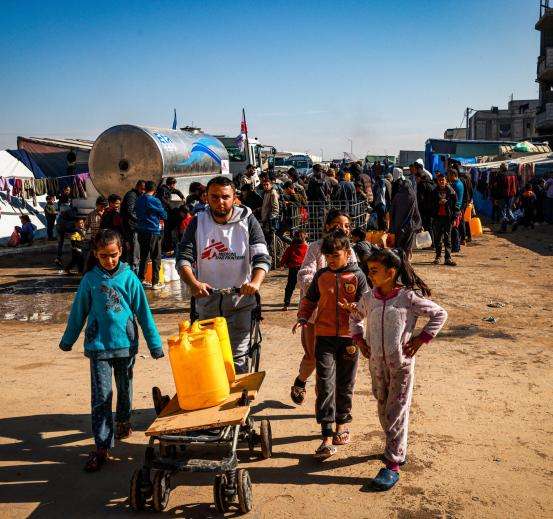
Israel is committing a genocide against Palestinians in Gaza. Through the destruction of vital civilian infrastructure—such as hospitals, shelters, and schools, as well as food production capacities and other basic livelihood facilities like water treatment plants—the Israeli authorities are purposefully and systematically destroying the conditions necessary for Palestinian life in Gaza.
MSF has continuously called for a sustained and immediate ceasefire in Gaza since November 2023, along with other humanitarian actors. The temporary ceasefire implemented on January 19, 2025 brought much-needed but short-lived respite to Palestinians in Gaza. But since hostilities resumed on March 18, the Israeli military campaign has intensified while the humanitarian situation has deteriorated drastically.
We continue our call for an immediate and sustained ceasefire to put an end to the suffering of Palestinians in Gaza. But even if Israel’s military assault ended immediately, the impact of such devastation and destruction would be a massive feat to rebuild and recover, and the physical and mental health consequences will last for decades.
Israel’s blockade and deliberate obstruction of humanitarian aid and other supplies has turned survival into a daily battle for Palestinians in Gaza. People need urgent and sufficient access to water, food, fuel, and other critical supplies that are being denied entry, even when they’re waiting in trucks just across the border. Palestinians have been left with no choice but to risk their lives trying to get aid at deadly GHF distribution sites.
As hunger deepens in Gaza, many of our staff are eating just one meal a day, while the lack of fuel has forced us to reduce urgently needed water trucking activities. The siege has also resulted in depleted stocks of medical supplies, with MSF facing particularly acute shortages of medications for pain management and chronic illnesses, antibiotics, and critical surgical materials.
Israeli forces’ sudden displacement orders, continuous attacks on medical and humanitarian facilities, and the punishing siege are severely impeding the humanitarian response in Gaza. Israeli authorities have deliberately made the delivery of humanitarian and medical aid nearly impossible, impacting aid organizations’ capacities to respond and the safety of personnel and patients. Evacuation orders also make it harder for people to access critical support like water distribution points, and organizations carrying out water trucking can no longer reach areas where people have gathered.
The survival of Palestinians lies at the mercy of Israeli authorities. We reiterate our call for an immediate end to the siege and for the facilitation of the entry of food, water, fuel, and medical supplies at a scale sufficient to meet the massive and escalating needs. All parties must ensure safe routes to move humanitarian assistance into and around the Gaza Strip and for aid to be allowed to reach those in desperate need.
All governments, including the US, must stop sending weapons that are being used to commit genocide in Gaza.
Arms transfers to Israel are fueling the mass killing of civilians, demolition of vital civilian infrastructure, and the systematic destruction of the health system in Gaza. States have a responsibility to prevent genocide and to ensure that the weapons they provide are not being used to harm civilians, violate human rights, or commit war crimes. They cannot claim to uphold humanitarian values while supporting a military campaign that is destroying the conditions of life in Gaza.
Gaza’s health care system has been systematically decimated by Israeli forces. MSF staff and patients have been forced to leave at least 18 different health structures and have endured more than 50 violent incidents, including airstrikes against hospitals, tank shells being fired at deconflicted shelters, ground offensives into medical centers, and convoys being fired upon.
Humanitarian and health care workers have also been repeatedly attacked and forced to evacuate: At least 479 aid workers, the vast majority of them Palestinian, have been killed over the last year and a half, as well as 1,580 health workers. Among the health and humanitarian workers killed are 13 of our MSF colleagues, some of whom were killed on MSF premises or in MSF-supported health facilities.
We demand accountability and the protection of civilians, health care facilities, and health workers at all times. Israeli forces’ attacks must end; the protected status of health personnel must be respected. We call for independent investigations into these violations, including the killing of our own staff and members of their families, and urge Israel’s allies to increase pressure to end the collective punishment of Palestinians.
The Israeli-US food distribution scheme in Gaza, the so-called Gaza Humanitarian Foundation (GHF), is slaughter masquerading as humanitarian aid. Since its launch in late May, more than 1,000 Palestinians have been killed and nearly 11,000 wounded while seeking food.
Aid is not a bargaining chip. It is a lifeline. Denying it is collective punishment—a war crime.
The World Health Organization reports that over 15,800 people are in urgent need of medical evacuation from Gaza, yet only a tiny fraction are able to actually do so. Israeli authorities must facilitate the medical evacuation of all patients who require treatment that is not available in the Strip. These patients must be able to travel with at least one caregiver, and there must be no prejudice to their right to a safe, voluntary, and dignified return to Gaza.
Israeli authorities have weaponized food and water in Gaza, restricting or outright blocking supplies and systematically destroying infrastructure like water pumps and desalination plants. These actions have manufactured a famine in parts of the Strip, which the Integrated Food Security Phase Classification (IPC) officially declared in Gaza governorate in August. As a result, MSF teams have admitted a steady and significant increase of patients with malnutrition at our clinics, including children under 5 years old, who are the most vulnerable. The number of patients enrolled in our malnutrition program in Gaza City quadrupled between May and July, while the rate of children with severe malnutrition tripled within just two weeks.
As people starve in Gaza, trucks carrying food and other aid remain stuck on the other side of the border, subject to a slow and inconsistent process of approvals by Israeli authorities. Palestinians are being forced to risk their lives to get food at distribution sites run by the Gaza Humanitarian Foundation (GHF), where aid seekers have been massacred almost daily since its launch in May. This is slaughter masquerading as humanitarian aid, and it must end now. MSF calls for the dismantlement of GHF and for the entry of independent humanitarian aid at scale.
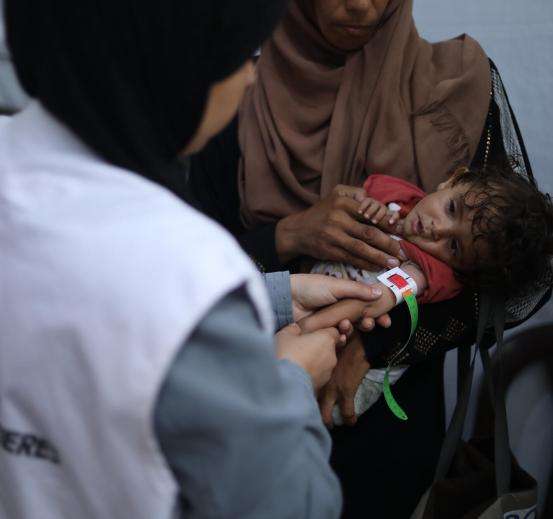
Health care staff and humanitarian workers must be protected.
Read moreThe genocide in Gaza is part of a broader system of Israel’s decades-long occupation of Palestinian territory. Just 30 miles away, Palestinians in the West Bank are being forcibly removed from their homes and land by Israeli policies deliberately designed to prevent any possibility of return. Violence against Palestinians by Israeli forces and settlers has become normalized. At least 995 Palestinians have been killed in the West Bank since October 2023, on top of the massive death toll in Gaza.
MSF teams working in the West Bank have witnessed these policies and practices at work for years. And with recent calls by Israeli authorities to fully annex the West Bank, the risk of ethnic cleansing in the territory has risen significantly. We urge all states with close political, military, or economic ties to Israel—including the US and European Union member states—to apply meaningful pressure to halt practices that harm and forcibly displace Palestinians, and to ensure an end to the occupation that is illegal under international law.
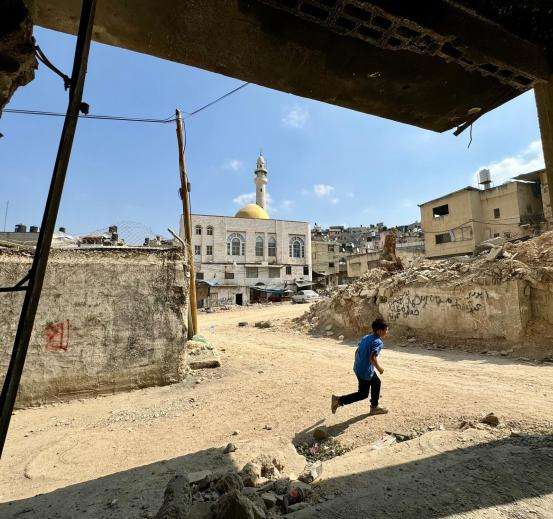
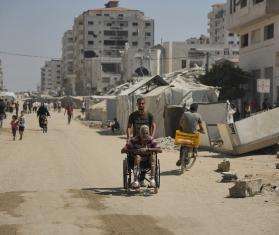
Sep 10, 2025 | Updated 3 days ago
Gaza City offensive is a death sentence for 1 million Palestinians
Read more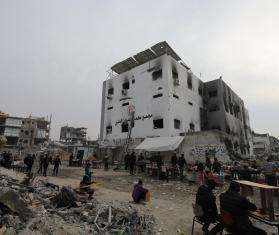
Sep 05, 2025 | Updated 2 weeks ago
Terrified Palestinians in Gaza City are being bombed day and night
Read morea094.png)
Aug 21, 2025 | Updated 2 weeks ago
Israel is intentionally depriving Palestinians of water
Read more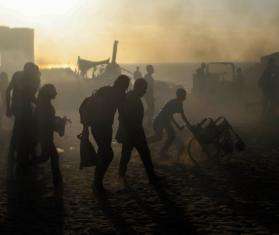
Aug 14, 2025 | Updated 1 month ago
Israel threatens to ban major aid organizations as starvation deepens in Gaza
Read moreSome humanitarian crises make the headlines—others don’t. Unrestricted support from our donors allows us to mobilize quickly and efficiently to provide lifesaving medical care to the people who need it most, whether those needs are in the spotlight or not. And your donation is 100 percent tax-deductible.